Anxiety in Beijing as officials battle new coronavirus outbreak
Anxiety in Beijing as officials battle new coronavirus outbreak
Chinese capital abruptly imposes lockdowns after fresh cases threaten official narrative of success
Zhang Le, 25 has been waiting for more than two hours outside a car park to be tested for coronavirus. Police officers stand behind a cordon, futilely shouting through loudspeakers for people not to gather in groups. When they are not looking, two women duck under the tape and jump the queue.
An officer tells Zhang and his colleagues, restaurant workers in a shopping mall, to go to the other entrance to the testing centre, set up on the outskirts of a park. They trudge over there only to be turned away again. Nearby, people stand or sit in groups as police try to herd them away.
“I don’t know who organised this but it doesn’t make a lot of sense. With this many people, what if by coming here you get the virus?” says Zhang.
Like most people told by their local neighbourhood committee or their managers at work to come here to get tested, he is confused and annoyed.
After months of lauding its victory over Covid-19 and offering other countries its expertise, China has been hit by a new outbreak, in arguably the worst place possible for the Chinese leadership: Beijing.
“Beijing is much more important not just because it is the seat of political power but because they have painted this narrative … that China has come out of it under the party leadership. So this new outbreak is casting doubt on this successful narrative,” said Zhou Xun, a specialist in health intervention in China at the University of Essex.
In the last eight days, Beijing has recorded almost 200 new cases of coronavirus, linked to a sprawling wholesale market in the city’s south-east. That market and two others have been shut and at least 33 neighbourhoods have been put under varying levels of lockdown. Schools and sports and entertainment venues have been closed.
Officials have ordered all residents to avoid non-essential travel outside of the capital, and suspended hundreds of flights and all long-distance buses. Other cities and provinces have begun to impose quarantine measures on travellers from Beijing.
The city had lowered its Covid emergency response level on 6 June, only to raise it again 10 days later, and residents have reacted with a mixture of frustration and anxiety. Roads that were crowded as offices and businesses reopened are emptier again.
Some of those abruptly placed under lockdown panicked and posted messages online pleading for help. One resident who claimed to live near the Xinfadi market said families in their compound had run out of food. Officials have since said those in home quarantine will be given help to get supplies.
Other people posted accounts of being forced to undergo coronavirus tests and quarantine even though they had not gone near the Xinfadi market. “What kind of big data is this,” wrote one person who said they had been ordered into quarantine after driving within 5km of the neighbourhood deemed high risk near Xinfadi.
Over the last week, Beijing has tested about 700,000 people. “Everyone is scared. No one wanted this to happen,” says Zhang, waiting in the queue near Chaoyang park.
Another person there, Shi Panyu, 25, says: “You think something can’t happen again – and then it does.” Since the new year, he says, he has dutifully worn a face mask outdoors and abided by safety measures. “I was not expecting a second wave in Beijing.”
On Thursday the head epidemiologist at the Chinese Centre for Disease Control and Prevention, Wu Zunyou, said the outbreak had been brought under control, but cautioned that new cases could continue to rise “for some time” before levelling off as they did in Wuhan.
Public health experts say the outbreak in Beijing says less about China’s handling of the crisis than about the difficulty of containing the virus without a vaccine.
“The virus does not obey orders, draconian measures or territorial borders. So that just shows there’s a limit even for an authoritarian state that has made all-out efforts to contain the outbreak,” said Huang Yanzhong, a senior fellow for global health at the Council on Foreign Relations in the US.
He warned that without identifying the origin of the outbreak, it could not be stopped. “Even though there is no increase of cases, it does not necessarily suggest the outbreak is under control,” said Huang. “You can test the people, treat the people, quarantine and isolate them, but if the source of the problem remains, that means you have not found the fundamental solution.”
The origin of the new outbreak has become a political issue, much like there was controversy over whether the virus began in Wuhan, where it was first detected last year. Chinese government researchers and officials have suggested the virus came from contaminated salmon from overseas. Another theory is that a “super-spreader” infected people at the market.
Scientists have estimated that the earliest infections were in late May or early June, but the director of China’s CDC has said the virus may have been spreading a month earlier.
On Friday Beijing released the genome of the virus, concluding that it appeared to be a European strain. “The virus is from Europe, but it is different from the virus currently spreading in Europe,” said Zhang Yong, an official with the CDC. “It’s older than the virus currently spreading in Europe.”
Epidemiologists and public health experts have called for more details, while critics say Beijing appears to be pushing the idea that the virus came from overseas as a way to deflect blame. “This is consistent with the message the authorities have been propagating that the virus is a menace from the outside,” said Zhou.
To Zhou, it is clear authorities are working hard to make sure Beijing does not become “Wuhan 2.0”. Within days of the new outbreak emerging, three people were fired over their handling of the crisis, and officials have been holding regular, sometimes multiple daily press conferences and releasing constant updates on the latest measures and figures. “It’s a way of reassuring people that they are in control,” Zhou said.
The deluge of information masks suppression in other ways. At the Jinying seafood and produce market near the testing site in Chaoyang park, staff appeared anxious to project an image of control. Workers were disinfecting the market as one vendor wearing a mask dozed at his stall.
Managers said the company operating the market was not accepting interviews from foreign media. A group surrounded two Guardian reporters, forcing them to delete any photos or recordings taken from the market and physically blocking them from leaving.
As police began to turn people away from the testing site at the park, groups discussed where to go for lunch. They would be notified when there was space to be tested.
Like many residents, Zhang is perhaps more nervous about losing work than about catching the virus. For him, the possibility that the outbreak may be worse than is known or that authorities may be covering up critical information – as in the early days of the Wuhan outbreak – is not a chief concern.
“Even if they were,” he says, “we can’t do anything about it.”
Additional reporting by Lillian Yang
With those in power failing us …
… at this historic moment, we demand better. From the covid pandemic and police brutality to the marginalisation of minority communities around the world, leadership is broken. Devoid of the humility and inclusivity we so desperately need, leaders are gambling with public health, safety and the future of younger generations. Lacking in honesty and transparency, poor at crisis management, and given to narcissism, our leaders unapologetically prioritise serving themselves over the people they were elected to serve. We have to make them raise their game.
That’s what the Guardian’s here for. As an open, independent news organisation we investigate, interrogate and expose the incompetence and indifference of those in power, without fear. Our journalism is free from political and commercial bias – this makes us different. We can give a voice to the oppressed and neglected, and stand in solidarity with those who are calling for a fairer future. With your help we can bring about improvement.
Millions are flocking to the Guardian for quality news every day. We believe everyone deserves access to information that is fact-checked, and analysis that has authority and integrity. That’s why, unlike many others, we made a choice: to keep Guardian reporting open for all, regardless of where they live or what they can afford to pay.
We’re determined to provide journalism that helps each of us better understand the world, and take actions that challenge, unite, and inspire change – in times of crisis and beyond. Our work would not be possible without our readers, who now support our work from 180 countries around the world.
But news organisations are facing an existential threat. With advertising revenues plummeting, the Guardian risks losing a major source of its funding. More than ever before, we’re reliant on financial support from readers to fill the gap. Your support keeps us independent, open, and means we can maintain our high quality reporting – investigating, disentangling

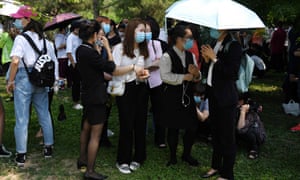
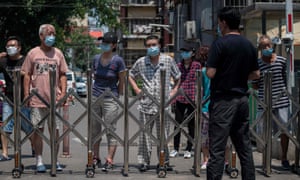
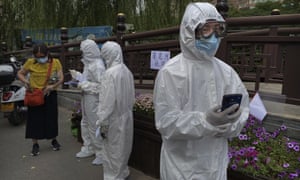
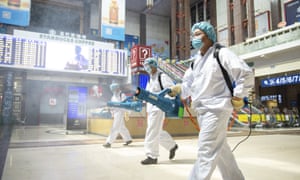
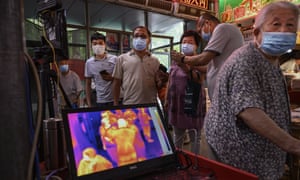
Comments
Post a Comment